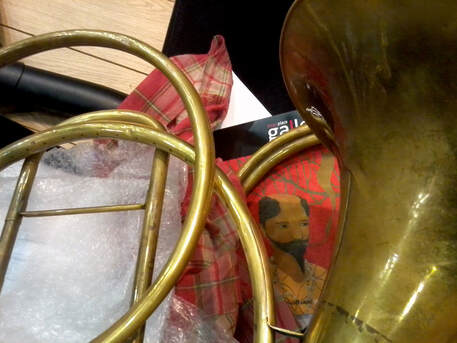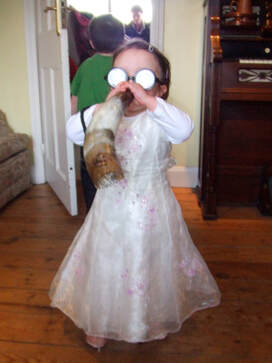
“If you’re not nervous, then you’re not paying attention” – Miles Davis
“I wouldn’t give a nickel for an actor who isn’t nervous” – David Belasco
My Course - Music Performance Anxiety as Transformation
My doctoral research in music performance anxiety has led me to a thought-provoking conclusion:
Your performance anxiety is a new and interesting musician trying to get out!
Come and find out how your performance anxiety can transform you as a musician. We can work with your performance anxiety to find out what it means for you. We won’t suppress any symptoms, we will bring them out, play with them, take them on a ride to find their hidden message - a message that could help you be the musician you always wanted to be! Performance anxiety can be the key to your artistic development.
“Anxiety is the dizziness of freedom” – Soren Kierkegaard
“Left to itself, the physiological intelligence is almost incapable of making a mistake” – Aldous Huxley
Tested by research!
My PhD used concepts of anxiety from psychoanalysis and existentialism in order to develop a new conception for music performance anxiety that:
Have you noticed how some musicians say they can’t perform because they have nerves and others that they need nerves to perform well?
Some people interpret nerves as excitement, others as being unpleasantly out of control. In fact a range of different responses to performance anxiety is possible:
“My knees are shaking” vs. “I’m quivering with excitement”
“My muscles are stiff” vs. “I’m wound up, ready to unleash on the music”
“I’m scared of what so-and-so might think” vs. “so-and-so is such an inspiration”
“I can’t keep tempo in this bit” vs. “I love the timelessness here”.
It has also been pointed out that performance anxiety has many of the symptoms of being in love: strong heartbeat, shaking, heat, fantastical thinking…
Perhaps we can adjust our attitudes to this very common problem, perhaps learn a more helpful response. “Positive thinking! Come on, you can do it! You’re great!”
However, it is difficult to change thoughts from negative to something that seems more positive. And sometimes positive thoughts can be shallow and not really truthful, like whistling in the dark.
Instead, we can use the symptoms of performance anxiety to find something that really is true about ourselves, perhaps something we have forgotten or not dared hope for. This can be done by welcoming the symptoms instead of suppressing them.
Examples:
A violinist said that nerves give him a rough sound. I suggested making it more so. After initial reluctance, the greater contact with the string used to make it rougher transformed the tone into something he had always wanted - rich and expressive - but had long given up hoping to achieve.
A horn player developed a ‘head-wobble’ when under pressure. Encouraging her to play like this deliberately resulted in a pronounced vibrato. A story emerged that as a child she had always copied her string-playing family members in using vibrato as an expressive tool. At music college this vibrato was forbidden, but now she felt she could reclaim it as a personally expressive style.
In these examples I did not know how the performance anxiety might transform into something beneficial. With different people the same symptom might mean something different. There is no sense of “wobbling means vibrato”. I have also known it to transform into excitement at performing; muscular looseness; and ornamentation. The important thing is to start afresh with each person, exploring the symptoms with respect for the individual and reverence for the process that is unfolding. It can be magical…and fun.
“I wouldn’t give a nickel for an actor who isn’t nervous” – David Belasco
My Course - Music Performance Anxiety as Transformation
My doctoral research in music performance anxiety has led me to a thought-provoking conclusion:
Your performance anxiety is a new and interesting musician trying to get out!
Come and find out how your performance anxiety can transform you as a musician. We can work with your performance anxiety to find out what it means for you. We won’t suppress any symptoms, we will bring them out, play with them, take them on a ride to find their hidden message - a message that could help you be the musician you always wanted to be! Performance anxiety can be the key to your artistic development.
“Anxiety is the dizziness of freedom” – Soren Kierkegaard
“Left to itself, the physiological intelligence is almost incapable of making a mistake” – Aldous Huxley
Tested by research!
My PhD used concepts of anxiety from psychoanalysis and existentialism in order to develop a new conception for music performance anxiety that:
- Explains the reasons for particular symptoms;
- Suggests ways for using performance anxiety to improve performance;
- Respects the history, resilience and embodied wisdom of the musician who has performance anxiety.
Have you noticed how some musicians say they can’t perform because they have nerves and others that they need nerves to perform well?
Some people interpret nerves as excitement, others as being unpleasantly out of control. In fact a range of different responses to performance anxiety is possible:
“My knees are shaking” vs. “I’m quivering with excitement”
“My muscles are stiff” vs. “I’m wound up, ready to unleash on the music”
“I’m scared of what so-and-so might think” vs. “so-and-so is such an inspiration”
“I can’t keep tempo in this bit” vs. “I love the timelessness here”.
It has also been pointed out that performance anxiety has many of the symptoms of being in love: strong heartbeat, shaking, heat, fantastical thinking…
Perhaps we can adjust our attitudes to this very common problem, perhaps learn a more helpful response. “Positive thinking! Come on, you can do it! You’re great!”
However, it is difficult to change thoughts from negative to something that seems more positive. And sometimes positive thoughts can be shallow and not really truthful, like whistling in the dark.
Instead, we can use the symptoms of performance anxiety to find something that really is true about ourselves, perhaps something we have forgotten or not dared hope for. This can be done by welcoming the symptoms instead of suppressing them.
Examples:
A violinist said that nerves give him a rough sound. I suggested making it more so. After initial reluctance, the greater contact with the string used to make it rougher transformed the tone into something he had always wanted - rich and expressive - but had long given up hoping to achieve.
A horn player developed a ‘head-wobble’ when under pressure. Encouraging her to play like this deliberately resulted in a pronounced vibrato. A story emerged that as a child she had always copied her string-playing family members in using vibrato as an expressive tool. At music college this vibrato was forbidden, but now she felt she could reclaim it as a personally expressive style.
In these examples I did not know how the performance anxiety might transform into something beneficial. With different people the same symptom might mean something different. There is no sense of “wobbling means vibrato”. I have also known it to transform into excitement at performing; muscular looseness; and ornamentation. The important thing is to start afresh with each person, exploring the symptoms with respect for the individual and reverence for the process that is unfolding. It can be magical…and fun.
|
Course Structure
I have found that the best structure for this work is in groups, with observed one-to-one sessions. In that way, each participant gets full attention, while we can also learn from each other. Maximum 4 participants per course. A short introductory group Zoom call is therefore followed each course day by one-to-one exploration of your performance anxiety, observed by other course participants. (At your request, these sessions could be private.) The intensive course runs for 3 weeks, one day a week, with time to reflect between sessions. The next course will be on Fridays October 15, 22, then a two week gap to November 5. There is some flexibility within this depending on issues such as time zones, availability etc. Who can Apply? The course is for advanced amateur, professional and student musicians (any instrument) who wish to explore their performance anxiety. You need a good internet connection and access to Zoom. |
How to Apply
Apply by October 11th for the next course starting October 15th. Each day consists of a group Zoom call followed by one hour-long one-to-one session for each participant. Cost is £200/€235/$280. To apply, please contact me on the form below, or via Facebook messenger https://www.facebook.com/martin.lawrence.1428/ More courses coming up, watch this space! I am running a more general course about many aspects of performing including physical, mental, and creative issues at Benslow Music. Dates 2-4 May 2022. This is a residential course in beautiful surroundings. See this link: https://benslowmusic.org/index.asp?PageID=2978 |
Testimonials
“Anyone interested in performance anxiety (of any kind) - go & do this course! Martin Lawrence
was *the* person who helped me to overcome my performance anxiety issues, his approach is
stellar. Anyone interested in (solving) performance anxiety - this is your man & he‘s offering a
course on it: go sign up!”
"This is so helpful ... as someone who experiences crippling performance anxiety, thank you for sharing such a bold technique of exploring it. Just stunned and grateful for such an amazing and positive strategy for turning this from a negative to a positive."
"Martin completely knows his stuff, and is excellent at planning a course with an informal style - something that requires a lot of skill and planning. I was riveted!"
“The tutor was amazing and he created a very safe environment.”
“Martin is very skilled: addressing difficult personal issues with tact, insight and respect. I knew I would make progress on this course, and I did so, significantly.”
"Martin has immense skill in picking up aspects of what we say, how we play, our body language and facial expression and sensitively drawing out how we feel about our music - what holds us back. And then doggedly, persistently, encouraging us away from a 'technical' response and returning us to the ways the apparent 'mistake' or barrier can become a positive. He helped me connect much more fully with what my cello means to me."
“Anyone interested in performance anxiety (of any kind) - go & do this course! Martin Lawrence
was *the* person who helped me to overcome my performance anxiety issues, his approach is
stellar. Anyone interested in (solving) performance anxiety - this is your man & he‘s offering a
course on it: go sign up!”
"This is so helpful ... as someone who experiences crippling performance anxiety, thank you for sharing such a bold technique of exploring it. Just stunned and grateful for such an amazing and positive strategy for turning this from a negative to a positive."
"Martin completely knows his stuff, and is excellent at planning a course with an informal style - something that requires a lot of skill and planning. I was riveted!"
“The tutor was amazing and he created a very safe environment.”
“Martin is very skilled: addressing difficult personal issues with tact, insight and respect. I knew I would make progress on this course, and I did so, significantly.”
"Martin has immense skill in picking up aspects of what we say, how we play, our body language and facial expression and sensitively drawing out how we feel about our music - what holds us back. And then doggedly, persistently, encouraging us away from a 'technical' response and returning us to the ways the apparent 'mistake' or barrier can become a positive. He helped me connect much more fully with what my cello means to me."


